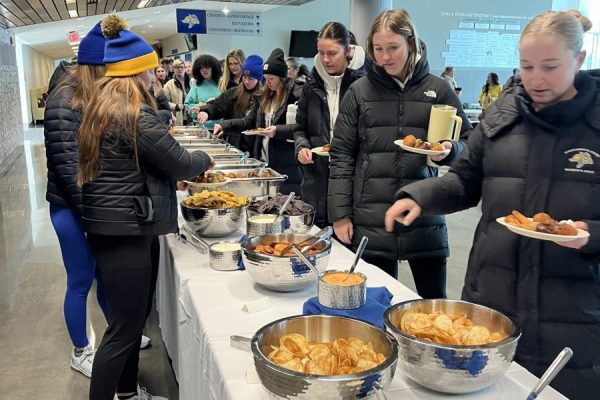African Night dispels stereotypes through dance and drama
April 15, 2019
No other international night has the responsibility of representing an entire continent of 54 diverse countries, but African Night does through dance, poetry, trivia and other performances from all over the continent.
The African Students Association held its annual African Night on Sunday, April 14 to place Africa’s cultural diversity on stage in front of South Dakota State University students and Brookings residents.
“We’ve been planning for about two months,” said Princess Baygboe, a member of the African Students Association who performed in the drama. “It’s difficult because we have to try and represent all the countries our students are from.”
Baygboe believes it’s particularly important for SDSU students to attend these events because they might not have the same opportunity when they graduate. She also says that, at this time in students’ lives, they need to experience and accept different cultures.
Brookings Mayor Keith Corbett agrees that coming to international nights and other cultural events on SDSU’s campus can enrich attendees’ lives and relationships with other cultures. Mayor Corbett attends each international night and says he enjoys the opportunity to meet with international students.
“We’ve got to try and get the word out,” Mayor Corbett said. “Some people might say they didn’t hear about it, but it’s a good time for the community to meet students so we appreciate each other more.”
The food and performances like the general dances showcased different parts of African culture or were primarily for entertainment, like Travis Nye’s magic act. Others, like the drama Baygboe, performed in, aimed at dispelling stereotypes that Africans are lazy or illiterate, and it discussed the diversity of Africa’s cultures.
“I talk differently to my friends. I talk differently to my parents,” said African Night host Excel Obi-Okoro. “Only a few people are able to stay true to themselves with all this American finesse.”
Sean Edeki, the president of the African Students Association, said that he has talked to other students about Africa and has seen stereotypes brought up in those conversations.
“The first question I asked was what do they know about Africa,” Edeki said. “They had all these stereotypes like there are camels everywhere, but Africa is not like that. It’s changing. Africa is colorful. It is beautiful. It is developing.”
A student from Augustana University, Luca Amayo, has also faced stereotypes. The student body president-elect of Augustana Student Association performed a poem he wrote after having a racial slur yelled at him by someone driving in a car three years ago. He chose to perform this poem after his running mate’s car had hateful comments written on it.
“Do I not fit the box you’ve drawn for me? Is that why you want me outlined on the tarmac?” Amayo said. “You will never make me small enough to be those ugly, ugly words.”
Students looking to learn more about other cultures and diffuse stereotypes they might have about other countries will need to wait until next year, but ASA plans to have African Night for many years to come.




















